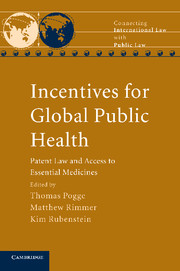Book contents
- Frontmatter
- Contents
- Contributors
- Series Editors' Preface
- Editors' Preface
- Introduction: Access to essential medicines: public health and international law
- Part I International trade
- Part II Innovation
- Part III Intellectual property
- 9 Opening the dam: patent pools, innovation and access to essential medicines
- 10 Open Source drug discovery: a revolutionary paradigm or a Utopian model?
- 11 Accessing and benefit sharing avian influenza viruses through the World Health Organization: a CBD and TRIPS compromise thanks to Indonesia's sovereignty claim?
- 12 The Lazarus Effect: the (RED) Campaign and creative capitalism
- Part IV Healthcare
- Bibliography
- Index
11 - Accessing and benefit sharing avian influenza viruses through the World Health Organization: a CBD and TRIPS compromise thanks to Indonesia's sovereignty claim?
Published online by Cambridge University Press: 04 August 2010
- Frontmatter
- Contents
- Contributors
- Series Editors' Preface
- Editors' Preface
- Introduction: Access to essential medicines: public health and international law
- Part I International trade
- Part II Innovation
- Part III Intellectual property
- 9 Opening the dam: patent pools, innovation and access to essential medicines
- 10 Open Source drug discovery: a revolutionary paradigm or a Utopian model?
- 11 Accessing and benefit sharing avian influenza viruses through the World Health Organization: a CBD and TRIPS compromise thanks to Indonesia's sovereignty claim?
- 12 The Lazarus Effect: the (RED) Campaign and creative capitalism
- Part IV Healthcare
- Bibliography
- Index
Summary
Introduction
The potential of avian influenza to infect humans on a pandemic scale with high mortality has created a new challenge for the United Nations Convention on Biological Diversity (‘CBD’) and the World Trade Organization's (‘WTO’) Agreement on Trade-Related Aspects of Intellectual Property Rights (‘TRIPS’ or ‘TRIPS Agreement’). The challenge arises in the context of the legal arrangements for access and sharing of the influenza virus and the likely benefits resulting from that sharing. It is encapsulated in the following:
A deal is being negotiated that could see Indonesia end its policy of withholding samples from human cases of avian flu. Until now, Indonesia has refused to share its samples with the World Health Organization (WHO), saying it is unfair that ownership of the samples passes to the WHO collaborating centres, and that it does not benefit from any resulting papers or patents.
Indonesia says it will share samples under a material transfer agreement that allows research use, but gives Indonesia sovereign ownership of the samples. The country also wants access to vaccines developed using its samples. An international meeting [in November 2007] ended without agreement. But a statement, still being thrashed out by negotiators, is expected to open the way to concessions.
There is a broadly accepted potential that vaccines can play a key role in limiting the impact of an avian influenza pandemic, although the most efficient and effective response requires access to the virus to make the appropriate vaccines.
- Type
- Chapter
- Information
- Incentives for Global Public HealthPatent Law and Access to Essential Medicines, pp. 284 - 312Publisher: Cambridge University PressPrint publication year: 2010



